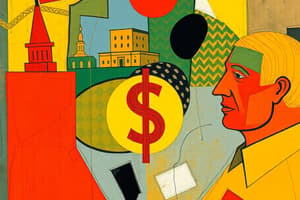Podcast
Questions and Answers
कम्यूनिझम म्हणजे काय?
कम्यूनिझम म्हणजे काय?
- सरकार आणि सामाजिक संस्थांना सहाय्य करण्यास समर्थ आहे.
- व्यक्तिक आपत्ति संपत्तीचे गुण आहे.
- एकत्रित संपत्ती राष्ट्राच्या हक्कांमध्ये वितरित केली जाणारी आहे. (correct)
- सरकार व्यापार चॅलेंज करते आणि उत्पादित करणे निर्देशित करते.
कम्यूनिझ्ममध्ये कोणता मुख्य प्रकार प्रमुख आहे?
कम्यूनिझ्ममध्ये कोणता मुख्य प्रकार प्रमुख आहे?
- व्यापार
- क्लास (correct)
- संपत्ती
- सरकार
कम्यूनिझ्ममधील कोणतं वैशिष्ट्य सर्वांत मोठं आहे?
कम्यूनिझ्ममधील कोणतं वैशिष्ट्य सर्वांत मोठं आहे?
- काहीही डिस्ट्रीब्यूट नसलेलं. (correct)
- लोकांना प्रमाणपत्र मिळतील.
- सरकारने बिझनेस क्रियाकलाप कसे कुंट्रोल केले.
- सार्वजनिक संपत्तीपेक्षा विशेष वैशिष्ट्य.
संघिकी, परंपरा, सरकार, कॉमन प्रॉपर्टी हे सर्व ____________ वेगळेपण.
संघिकी, परंपरा, सरकार, कॉमन प्रॉपर्टी हे सर्व ____________ वेगळेपण.
'कम्यूनिझ्म' हे प्रकार कोणतं समर्थन करतं?
'कम्यूनिझ्म' हे प्रकार कोणतं समर्थन करतं?
'कम्यूनिझ्म' मुळे कुत्रेही मुकंपूर, कुकृति, आनि भुकंप होतुन?
'कम्यूनिझ्म' मुळे कुत्रेही मुकंपूर, कुकृति, आनि भुकंप होतुन?
कॅपिटलिझम म्हणजे काय?
कॅपिटलिझम म्हणजे काय?
सोशलिझम म्हणजे काय?
सोशलिझम म्हणजे काय?
कॅपिटलिझम किती प्रकारात व्यवस्थित केले जाते?
कॅपिटलिझम किती प्रकारात व्यवस्थित केले जाते?
''सोशलिझम' की करते?
''सोशलिझम' की करते?
'कॅपिटलिझम' मुख्यप्रकारने कोणत्या हस्तींनी संपत्ती सुरू करते?
'कॅपिटलिझम' मुख्यप्रकारने कोणत्या हस्तींनी संपत्ती सुरू करते?
Flashcards are hidden until you start studying
Study Notes
Understanding Economic Systems
Economic systems refer to the ways societies organize their production of goods and services and distribute them among its members. There are various types of economic systems which we'll explore here:
Capitalism: One of the most prevalent economic systems today is Capitalism, where businesses privately own property and operate for profit. Governments regulate these businesses through taxation and other policies. In this system, ownership of capital—such as factories, machinery, land, etc.—is concentrated in the hands of individuals or groups that can then employ laborers for wages. This leads to an unequal distribution of wealth where those who have more money have more buying power, further contributing to income inequality. However, it also incentivizes innovation by allowing entrepreneurs to invest and risk their resources without government interference.
Socialism: Socialism departs from capitalism in that it involves collective or governmental ownership of major industries and natural resources such as railways, utilities, mineral deposits, banks, etc., rather than private individuals or corporations. It aims to reduce income inequality and ensure fairer access to opportunities, often ensured by strong trade unions. Though some forms of socialism advocate complete redistribution of wealth, practical examples may only aim for a reduction thereof. Notable countries practicing socialist economies include Cuba, Russia, China, Vietnam, Laos, Singapore, Myanmar, North Korea, Mongolia, Cambodia, and Ethiopia.
Communism: A form of radical socialism, Communism strives towards a classless society where all people share equally in the rewards produced by the community. Under communism, governments plan and control most business activities and redistribute income. There is little or no concept of personal property; instead, common ownership is vested in the state. Unlike the other two models, communism does not involve voluntary exchange between traders; everything is distributed according to need. While there have been several attempts at creating communist states, many have fallen apart due to poor planning, corruption, and famine.
Mixed Economy: In practice, few nations stick wholly to one model alone. Many nations have mixed economies, combining elements of both public and private sectors. For example, they might allow free market principles within certain areas while maintaining state involvement in others. These might exist alongside institutions like charitable trusts, co-operatives or mutual organizations.
In conclusion, economics encompasses important societal decisions around how best to allocate scarce resources to satisfy unlimited human wants and needs. Each type of economic system has pros and cons, with advocates arguing for what they believe will lead to a better world. As you navigate our globalized economy, understanding different perspectives and systems helps us appreciate diverse approaches to achieving prosperity and security.
Studying That Suits You
Use AI to generate personalized quizzes and flashcards to suit your learning preferences.




